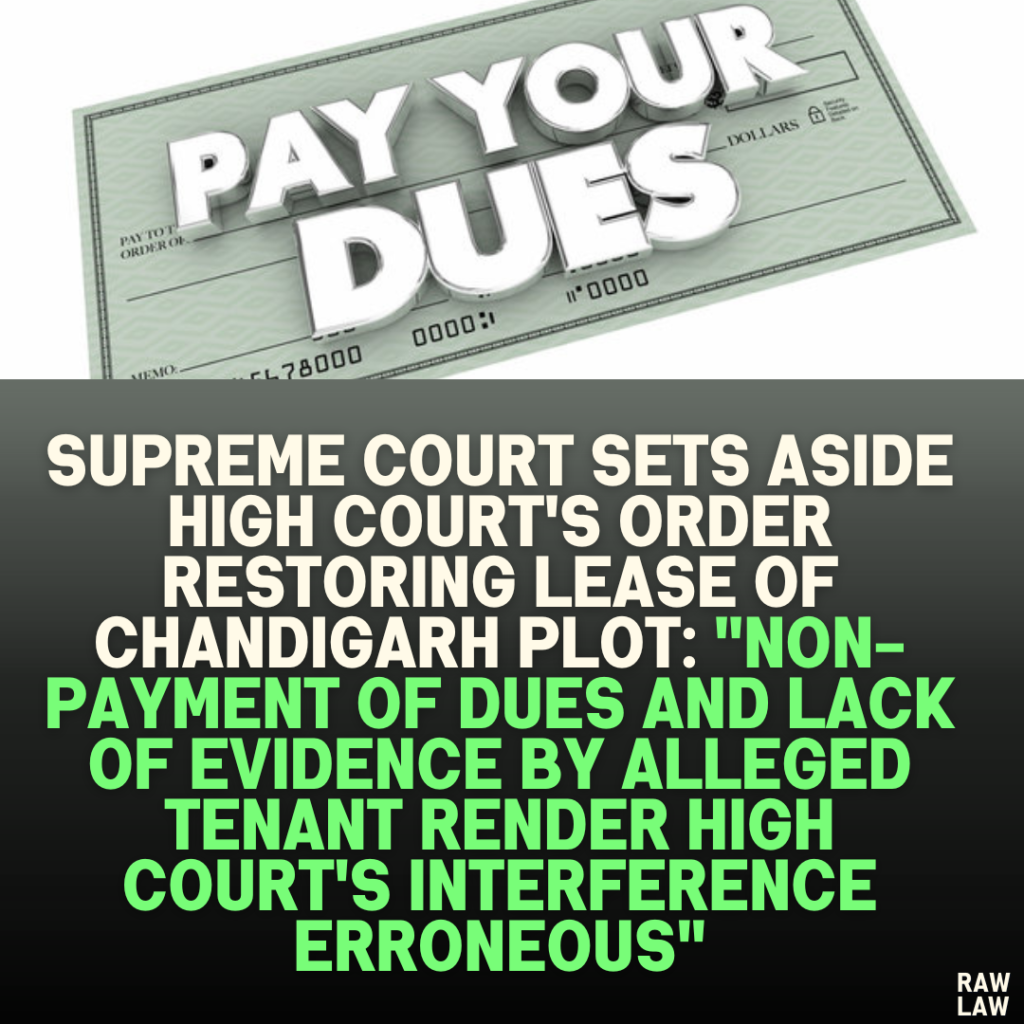Court’s Decision
The Supreme Court overturned the Punjab and Haryana High Court’s judgment that quashed the cancellation of a lease for Booth Site No. 14, Sector 46-C, Chandigarh. The Court ruled that the respondents failed to fulfill the lease payment conditions and dismissed the claim of tenancy made by M/s. Mohit Medicos due to lack of supporting evidence. The High Court’s decision to restore the lease was found erroneous and an abuse of judicial discretion.
Facts
- Auction and Lease Agreement:
- The appellants auctioned Booth Site No. 14 in Chandigarh on February 12, 1989, on a 99-year lease basis.
- The respondents, referred to as allottees, secured the lease by paying 25% of the premium. The remaining 75% was to be paid in three annual installments starting February 12, 1990.
- Default and Show-Cause Notices:
- The respondents failed to pay the first installment. Consequently, a show-cause notice was issued on September 14, 1990, under Rule 12(3) of the Chandigarh Lease Hold of Sites and Buildings Rules, 1973.
- Lease Cancellation:
- Despite multiple opportunities for personal hearings, the respondents neither paid the dues nor appeared before the authorities. This led to the Assistant Estate Office canceling the lease on November 20, 1991.
- Appeals and Rejections:
- The respondents appealed to the Chief Administrator, Chandigarh, who conditionally restored the lease if they paid the premium, interest, and penalties within 15 days. The respondents failed to comply and filed a revision petition with the Advisor, Chandigarh, which was dismissed in 1999 due to delay and non-compliance.
- High Court Intervention:
- The High Court allowed the writ petitions filed by the respondents and M/s. Mohit Medicos (the alleged tenant), quashing the lease cancellation. It also directed the restoration of the lease.
Issues
- High Court’s Jurisdiction: Whether the High Court was justified in interfering with the statutory authorities’ decision under Article 226 of the Constitution.
- Locus Standi of M/s. Mohit Medicos: Whether the tenant had any legal standing to challenge the lease cancellation without evidence of a tenancy agreement.
- Compliance with Auction Terms: Whether the respondents’ failure to adhere to the payment schedule justified the cancellation.
Petitioner’s Arguments
The appellants argued:
- The respondents were given multiple opportunities to clear their dues but failed to comply.
- The alleged tenant, M/s. Mohit Medicos, was a proxy litigant with no evidence of a valid tenancy.
- The High Court disregarded the binding nature of statutory procedures and legal principles.
Respondent’s Arguments
The respondents contended:
- The High Court correctly quashed the lease cancellation and ensured natural justice.
- M/s. Mohit Medicos had locus standi under the definition of “transferee” in Section 2(k) of the Capital of Punjab (Development and Regulation) Act, 1952.
Analysis of the Law
- Lease Conditions and Defaults:
- The respondents were required to adhere to specific payment terms. Their failure to comply justified the cancellation under Rule 12(3) of the Chandigarh Lease Hold Rules.
- Procedural Fairness:
- The Assistant Estate Office issued a show-cause notice and granted personal hearings before cancellation, fulfilling procedural requirements.
- Tenant’s Claim:
- M/s. Mohit Medicos failed to produce any document proving its tenancy, undermining its claim of locus standi.
- High Court’s Role:
- The High Court exceeded its jurisdiction under Article 226 by interfering with statutory decisions that adhered to due process.
Precedent Analysis
The respondents relied on Brij Mohan v. Chief Administrator, where the court recognized tenants under certain circumstances. However, the Supreme Court distinguished the case, emphasizing the lack of evidence proving tenancy in the current matter.
Court’s Reasoning
- Failure to Comply:
- The respondents failed to fulfill the payment conditions despite multiple opportunities.
- The High Court’s directive to restore the lease overlooked the respondents’ defaults and undermined the statutory authorities’ decisions.
- Proxy Litigation:
- The alleged tenant, M/s. Mohit Medicos, lacked legal standing and engaged in proxy litigation on behalf of the defaulting respondents.
- No Evidence of Tenancy:
- The tenant failed to substantiate its claim with any lease agreement or supporting document.
- Abuse of Judicial Process:
- The litigation was deemed an abuse of the judicial process, as it sought to circumvent the lawful cancellation of the lease.
Conclusion
The Supreme Court allowed the appeals, restoring the cancellation orders issued by the Assistant Estate Office. It held that the High Court erred in granting relief based on unsubstantiated claims and failed to account for the respondents’ consistent defaults.
Implications
- Reinforcement of Statutory Authority:
- The judgment upholds the authority of statutory bodies to enforce lease agreements and penalize non-compliance.
- Limits on Judicial Intervention:
- The decision underscores the principle that High Courts should exercise caution under Article 226, particularly when statutory processes are followed.
- Locus Standi Requirements:
- The ruling reiterates that litigants must substantiate their claims with credible evidence to avoid frivolous litigation.
